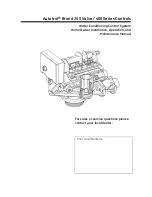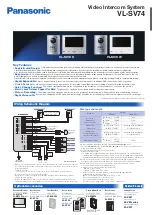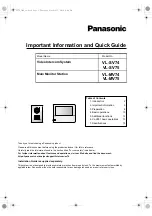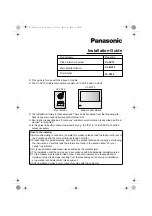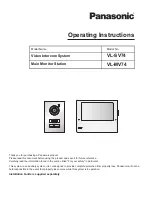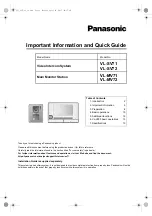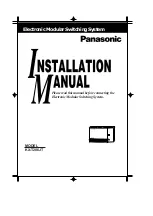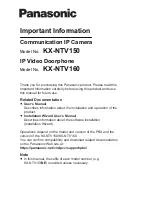
The Sigtronics’ SPA-600 is a voice actuated intercom with “transmit
through the aircraft radio capability” using your push-to-talk switch.
Three controls are provided:
Power Switch — Turns unit on and off.
Volume Control — Controls the intercom volume.
Squelch Control — Allows the setting of voice actuated (VOX) operation
of the intercom for variations in background noise levels and differences
in headset microphones.
OPERATING INSTRUCTIONS
I. INTERCOM MODE
A. Put on headset/s and position the boom mic close to the mouth, as
is the practice with a hand-held mic. Voice clarity is best when mic
is at one side of the mouth and 1/4” from the lips.
B. Set audio panel to “Headphone” position, if applicable.
C. Turn power “on” and set Volume Control to a low level. (1/4th to 1/3rd
open for best signal to noise ratio).
D. To adjust the intercom SQuelch for voice activated operation (VOX),
it is helpful to have some background noise present. Turn intercom
SQuelch control all the way counter-clockwise. Now, without
speaking, rotate the SQuelch control clockwise until you hear the
background noise in your headset. Next, rotate it counter-clockwise a
small amount and wait (approximately 1 second) until the background
noise disappears. Finally, make small adjustments until your voice
triggers the unit at comfortable speaking levels. This procedure is
necessary because the squelch is a “Fast-on, Slow-off” system.
Once set, the intercom stays silent until someone speaks in their
headset microphone (mic). Then it instantly turns on and relays the
conversation. After about a second of no conversation, the intercom
goes silent again.
Minor readjustment of the SQuelch may be necessary if the
background noise level changes signifi cantly (such as from taxi to
take-off power conditions).
II. RADIO TRANSMIT MODE — Transmitting from both pilot and co-pilot
positions is possible on a one-at-a-time basis. The transmitting mic
disables all other mics. When you are ready to talk to ATC, depress the
transmit switch on your yoke and your voice is automatically transmitted
via the aircraft radio. (You will hear your own voice when transmitting via
the aircraft radio side-tone return, If the radio does not have side-tone,
then you will not hear your voice). (A minor modifi cation to the intercom
will enable it to simulate side-tone).
III. RADIO MONITORING — Radio monitoring is automatic. The radio
monitor circuit is always active; even with intercom power switch
“off”.
IV. SOLO FLIGHTS — Since the intercom is not needed during solo fl ights,
it may be turned off. The pilot will still hear the aircraft radio, since
this circuit is always active, and the pilot may transmit to ATC via his
push-to-talk switch. (Co-pilot position cannot transmit when intercom
is off).
V. BACK-UP — If a problem is suspected in the intercom, simply turn it
off. You will still receive the aircraft radio and will be able to transmit
from the pilot’s position. The hand mic may also be used, however, the
Transcom should be turned off and you should unplug your boom mic
from the mic jack. (Leave headphone plugged in for radio reception).
CHASSIS INSTALLATION
The Sigtronics’ SPA-600 has been designed to mount either horizontally
or vertically in your aircraft panel. All necessary mounting hardware has
been supplied for a 6-way installation. (A round faceplate is also available
from Sigtronics to fi t a 2 1/4” round instrument hole).
HARDWARE SUPPLIED
• Six Headphone Output Jacks — Accept standard .250” aircraft
headphone plugs.
• Six Microphone Input Jacks — Accept standard .206” aircraft
microphone plugs (i.e. amplifi ed dynamic or electret). (U93 plug
compatible jacks can be used in place of the jacks provided).
• Mic Jack Insulating Washers: 6 shoulder and 6 fl at.
• Panel: Lettered on both sides.
• Control Knobs (2), Switch Nut (1), 4-40 Screws (2)
• Template: Hole size pattern for drilling aircraft panel.
• Aircraft / Intercom interface cable (4 feet long)
The location selected requires a minimum front panel area of 2-1/2” by
1-1/16”. Depth required behind panel is 4-3/16” plus cable access.
Caution: Move aircraft fl ight controls through limits of travel while
observing selected area to make sure rear of intercom and cable will not
interfere with aircraft control components.
PANEL PREPARATION:
1. Position adhesive template on aircraft panel in selected area.
2. Center punch each hole at cross lines. (The fi ve holes are in straight
line and equally spaced 0.4” apart.)
3. Drill 1/8” pilot hole all fi ve places.
4. Enlarge holes to 1/4” and 3/8” per template.
MOUNTING CHASSIS: See Figure 2.
1. Remove nut from Transcom ON-OFF switch bushing.
2. Remove knobs from Volume and Squelch controls. NOTE: DO NOT
REMOVE nuts from Volume and Squelch control potentiometers.
3. Remove two 4-40 panel screws and remove panel from Transcom
chassis.
4. Insert Transcom from rear of aircraft panel with appropriate arrow
pointing upwards.
(continued)
SPA-600 TSO INSTALLATION AND OPERATING INSTRUCTIONS
��������
�����
���� ���� ��
������
���
��������
�� ��� ������
����� ����
����
����
AIRCRAFT
PANEL
��������
������
����
���������
������
����
�����
������
���
��������
�����
����
������
���
Figure 2
Figure 3
Microphone Jack
Sigtronics Corporation
178 East Arrow Highway
San Dimas, CA 91773
Phone: (909) 305-9399
E-mail: info@sigtronics.com
Web Site: www.sigtronics.com
Figure 1




